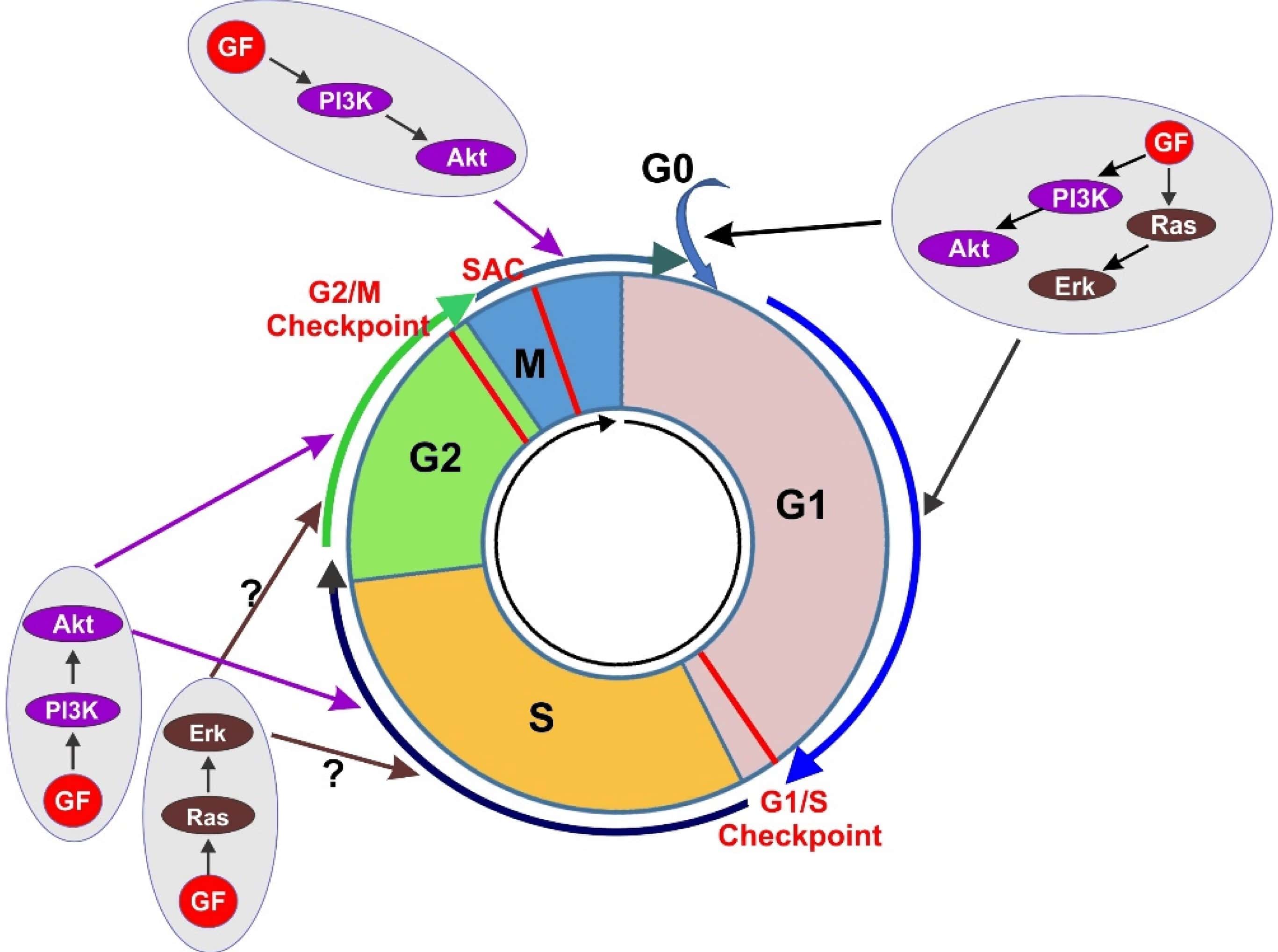
The cell cycle is a fundamental process that governs the growth, development, and reproduction of all living organisms. It involves a series of carefully orchestrated events that ensure the accurate duplication and distribution of genetic material. From the moment a cell is born to its ultimate division into two daughter cells, the cell cycle plays a crucial role in maintaining the integrity and functionality of biological systems.
In this article, we will uncover 14 mind-blowing facts about cell cycle progression that highlight the complexity and elegance of this biological phenomenon. From the intricate regulatory mechanisms that control each phase of the cell cycle to the potential implications for human diseases, these facts will provide a deeper understanding of the fascinating world of cell division.
Key Takeaways:
- The cell cycle consists of distinct phases, and errors in its regulation can lead to cancer. Understanding this process is crucial for developing targeted cancer therapies and maintaining our health.
- Stem cells have unique cell cycle properties and play a vital role in tissue regeneration. Studying the cell cycle provides valuable insights into aging, regeneration, and potential therapeutic interventions.
The cell cycle consists of distinct phases.
During the cell cycle, cells go through specific phases, including interphase, mitosis, and cytokinesis. Each phase has its own unique characteristics and plays a crucial role in cell division.
DNA replication occurs during the S phase.
One of the key events during the cell cycle is the replication of DNA, which takes place during the S phase. This ensures that each new daughter cell receives an identical copy of the genetic material.
Checkpoints monitor the progression of the cell cycle.
Checkpoint mechanisms are essential for maintaining the integrity of the cell cycle. They ensure that each phase is completed accurately before the cell proceeds to the next stage.
Cyclins and cyclin-dependent kinases (CDKs) control cell cycle progression.
Cyclins and CDKs are key regulatory proteins that orchestrate the progression of the cell cycle. Their levels fluctuate throughout the cycle, activating specific molecular events.
The G1 phase is a critical decision-making point.
During the G1 phase, cells decide whether to enter the cell cycle and proceed with division or exit into a non-dividing state called GThis decision is influenced by various internal and external signals.
The cell cycle is tightly regulated by tumor suppressor genes.
Tumor suppressor genes, such as p53, play a crucial role in maintaining the stability of the cell cycle. They prevent the progression of damaged or abnormal cells, acting as guardians against cancer development.
Errors in cell cycle regulation can lead to cancer.
When the control mechanisms of the cell cycle fail, it can result in uncontrolled cell growth and the formation of tumors. Understanding the cell cycle is vital for developing targeted cancer therapies.
Different cell types have varying cell cycle lengths.
Cells in the human body have diverse functions and, consequently, different cell cycle lengths. Some cells divide rapidly, while others remain in a non-dividing state for extended periods.
Stem cells have unique cell cycle properties.
Stem cells have the remarkable ability to self-renew and differentiate into various cell types. They possess unique cell cycle properties that allow for controlled division and tissue regeneration.
Cell cycle abnormalities contribute to genetic disorders.
Genetic disorders can arise from disruptions in the cell cycle. Conditions like Down syndrome and Turner syndrome result from abnormalities in the cell division process.
External factors can influence cell cycle progression.
Environmental cues and signals can impact cell cycle progression. Factors such as growth factors, hormones, and nutrient availability can influence the timing and rate of cell division.
Some cells permanently exit the cell cycle.
In certain tissues, cells permanently exit the cell cycle and enter a state of terminal differentiation. Neurons in the brain, for example, no longer divide once they have reached their mature form.
Cell cycle progression is essential for embryonic development.
The precise regulation of the cell cycle is crucial for embryonic development. Cell division and differentiation occur in a coordinated manner to form complex structures and organs.
Cell cycle research aids in understanding aging and regeneration.
Studying the cell cycle provides valuable insights into the processes of aging and tissue regeneration. Understanding how cells divide and renew offers potential avenues for therapeutic interventions.
These 14 mind-blowing facts about cell cycle progression demonstrate the intricate nature of this fundamental biological process. From understanding the regulatory mechanisms to the implications for human health, the cell cycle continues to captivate researchers and expand our knowledge of life itself.
Conclusion
The cell cycle progression is a fascinating and crucial process that governs the growth and development of all living organisms. Through a series of intricate molecular events, cells are able to replicate their DNA, divide, and maintain the balance between growth and repair. Understanding the cell cycle is not only essential for advancing our knowledge of biology, but also has significant implications in fields such as medicine and genetics.
From the discovery of the cell cycle to the identification of key regulators, scientists have made remarkable progress in unraveling its mysteries. With each new revelation, we gain deeper insights into the intricacies of life itself.
As we continue to delve into the complexities of cell cycle progression, we unlock the potential for groundbreaking discoveries that could revolutionize our understanding of diseases, aging, and regeneration. The cell cycle is a testament to the incredible marvels of biology, and it will continue to captivate researchers for years to come.
FAQs
1. What is the purpose of cell cycle progression?
The cell cycle progression is essential for cell growth, development, and reproduction. It ensures that cells divide properly and maintain the balance between growth and repair.
2. How is DNA replicated during the cell cycle?
DNA replication occurs during the S phase of the cell cycle. The DNA strands separate, and each strand serves as a template for the synthesis of a new complementary strand.
3. What are the key regulators of the cell cycle?
The cell cycle is regulated by a complex network of proteins, including cyclins and cyclin-dependent kinases (CDKs). These proteins control the progression of the cell cycle by activating specific checkpoints and ensuring that each phase occurs in the correct sequence.
4. What happens if the cell cycle is disrupted?
If the cell cycle is disrupted, it can lead to various abnormalities, such as uncontrolled cell growth (cancer) or cell death. Proper regulation of the cell cycle is crucial for maintaining the integrity and functionality of cells.
5. Are there any diseases associated with cell cycle dysfunction?
Yes, diseases such as cancer are often the result of cell cycle dysfunction. Mutations in genes involved in cell cycle regulation can lead to uncontrolled cell division and tumor formation.
Intrigued by cell cycle progression's intricate dance? Keep exploring biology's marvels! Unravel DNA damage response's astounding facts, from repair mechanisms to consequences for health. Each cellular process intertwines, weaving life's tapestry. Dive deeper into these fascinating topics and expand your understanding of the microscopic world within us.
Was this page helpful?
Our commitment to delivering trustworthy and engaging content is at the heart of what we do. Each fact on our site is contributed by real users like you, bringing a wealth of diverse insights and information. To ensure the highest standards of accuracy and reliability, our dedicated editors meticulously review each submission. This process guarantees that the facts we share are not only fascinating but also credible. Trust in our commitment to quality and authenticity as you explore and learn with us.


